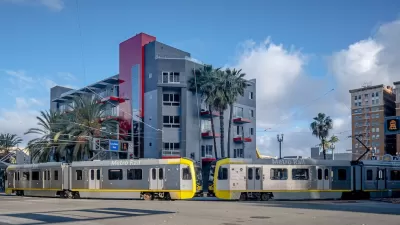Thanks to parking reforms at the state level, Oregon cities are rapidly eliminating parking requirements, paving the way for more affordable housing construction and higher density.

Minimum parking requirements are quietly being eliminated in cities across Oregon, writes Catie Gould for the Sightline Institute.
Normally, parking is one of the most contentious issues for local governments. Any relaxation of parking mandates—rules that prescribe a certain minimum number of parking spaces for any new home or business—is a political hot potato. But new state parking rules have taken that status quo off the table and turned what could be a big debate into a boring compliance exercise.
Cities that want to retain parking minimums under the new state law would have to comply with a complex series of regulations, making the choice to eliminate parking mandates an easy one for many communities. “Now over a million Oregonians live in communities where parking is fully voluntary. More cities are poised to join them the next year, after using a deadline extension granted by the state.”
The domino effect is aided by another law passed in early 2022 that removed parking mandates on developments near transit corridors and stations, which, in some cities, cover the majority of lots. Fully eliminating parking minimums also means cities don’t need to adjust requirements when transit service changes, making it easier for property owners to build ADUs and other ‘missing middle housing’ that is often made too costly by the addition of parking.
FULL STORY: PARKING MANDATES ARE VANISHING ACROSS OREGON

Alabama: Trump Terminates Settlements for Black Communities Harmed By Raw Sewage
Trump deemed the landmark civil rights agreement “illegal DEI and environmental justice policy.”

Study: Maui’s Plan to Convert Vacation Rentals to Long-Term Housing Could Cause Nearly $1 Billion Economic Loss
The plan would reduce visitor accommodation by 25% resulting in 1,900 jobs lost.

Planetizen Federal Action Tracker
A weekly monitor of how Trump’s orders and actions are impacting planners and planning in America.

Waymo Gets Permission to Map SF’s Market Street
If allowed to operate on the traffic-restricted street, Waymo’s autonomous taxis would have a leg up over ride-hailing competitors — and counter the city’s efforts to grow bike and pedestrian on the thoroughfare.

Parklet Symposium Highlights the Success of Shared Spaces
Parklets got a boost during the Covid-19 pandemic, when the concept was translated to outdoor dining programs that offered restaurants a lifeline during the shutdown.

Federal Homelessness Agency Places Entire Staff on Leave
The U.S. Interagency Council on Homelessness is the only federal agency dedicated to preventing and ending homelessness.
Urban Design for Planners 1: Software Tools
This six-course series explores essential urban design concepts using open source software and equips planners with the tools they need to participate fully in the urban design process.
Planning for Universal Design
Learn the tools for implementing Universal Design in planning regulations.
Caltrans
Smith Gee Studio
Institute for Housing and Urban Development Studies (IHS)
City of Grandview
Harvard GSD Executive Education
Toledo-Lucas County Plan Commissions
Salt Lake City
NYU Wagner Graduate School of Public Service





























